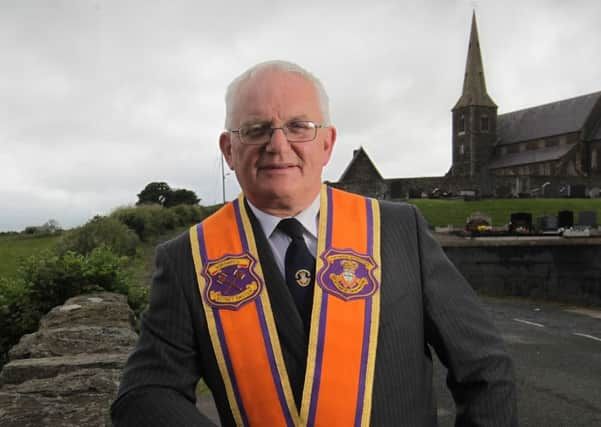Senior Orangeman urges DUP and SF to '˜grasp the nettle' on parading


Darryl Hewitt, the Orange Order’s district master in Portadown, said that joint DUP and Sinn Fein proposals for a new parades system six years ago – which the Orange rejected – may need to be revisited.
On Saturday, the News Letter revealed the extraordinary lengths to which Mr Hewitt has gone in an attempt to get Garvaghy Road residents to even talk to the Orange Order, with the Orange proposal for a Roman Catholic priest to chair talks at a Catholic venue rejected by the residents.
Advertisement
Hide AdAdvertisement
Hide AdThere have been few serious political moves to replace the Parades Commission over recent years and in the recent DUP manifesto the issue of parading merited just a solitary sentence: “The DUP supports new legislation for a fresh start on how parades and protests are dealt with in Northern Ireland.”
There was no reference whatsoever to the issue in Sinn Fein’s manifesto.
Mr Hewitt told the News Letter: “They’re going to have to grasp the nettle. If they want the two communities to come together ... [it has to be addressed].”
He added: “The DUP, Sinn Fein, the Executive, need to come up with a system for parading that does away with this unelected and unaccountable quango called the Parades Commission.
Advertisement
Hide AdAdvertisement
Hide Ad“Now I know there were proposals and the main opponent at the time was the Orange Institution.
“Maybe that needs to be revisited, maybe it needs to be tweaked, because I have a view that probably one of the main reasons for it being rejected was an anti-DUP feeling at that time.”
Four years ago, the most influential Orange figure, Grand Secretary Drew Nelson, told the News Letter that the Order does accept that there should be somebody to adjudicate when one side wants to march and another side wants to stop that march, saying that “at the end of the day, somebody has to take a decision about a parade”.
He said that he saw three possible decision-makers when it comes to deciding on contentious parades – the local authority (in Northern Ireland, the local council or the Stormont Executive), the police or a special body independent of politicians and the police, as is currently the case with the Parades Commission.
Advertisement
Hide AdAdvertisement
Hide AdHe said that Northern Ireland is the only part of western Europe which uses an independent body to decide on contentious parades and, although he acknowledged that there are “unique problems” in Northern Ireland, he said: “I think that it is worth looking at the other models that are in use across Europe and perhaps a little further afield.”
Mr Nelson, who had just returned from observing a contentious parade in Spain, said at the time: “Our problems in Northern Ireland are not unique and I think it is well worth our while – for all parties involved – just to have a look and see if there’s anything out there in other places which might be helpful to us.”
How the last DUP-SF attempt fell apart
Although it was the Orange Order’s opposition to the Public Assemblies, Parades and Protests Bill which saw it withdrawn by the DUP and Sinn Fein, aspects of the proposed replacement for the Parades Commission were also opposed by trade unions, churches and even the police.
Initially, the bill was drafted so widely that it would have drawn in trade union protests, open-air church services and even vintage car rallies.
Advertisement
Hide AdAdvertisement
Hide AdAfter criticism, the DUP and Sinn Fein amended the draft legislation to focus it more on loyal order parades or other parades which could be contentious.
However, with the UUP and TUV opposed to the bill, the DUP did not have sufficient support at Grand Lodge to see it passed and the Order rejected it by 37 votes to 32.
At the time, Orange Grand Secretary Drew Nelson supported the DUP-SF proposals. But subsequently he said that he came to believe that the system then on offer would have been too bureaucratic.